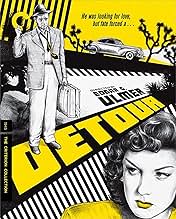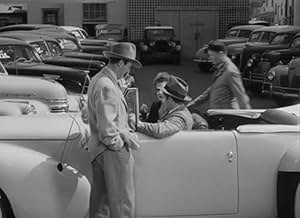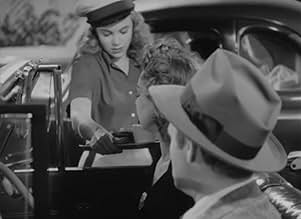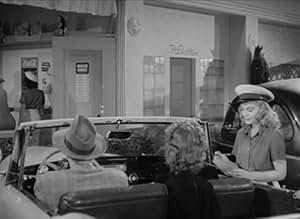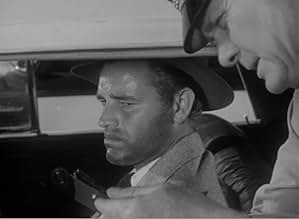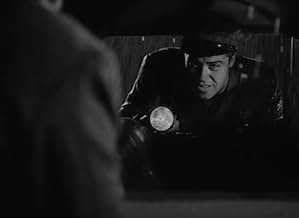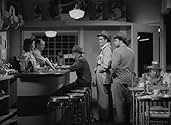CALIFICACIÓN DE IMDb
7.3/10
21 k
TU CALIFICACIÓN
El azar atrapa al autoestopista Al Roberts en una trama noir.El azar atrapa al autoestopista Al Roberts en una trama noir.El azar atrapa al autoestopista Al Roberts en una trama noir.
- Premios
- 1 premio ganado en total
Don Brodie
- Used Car Salesman
- (sin créditos)
Roger Clark
- Cop
- (sin créditos)
Eddie Hall
- Tony - Used-Car Lot Mechanic Inspecting Car
- (sin créditos)
Harry Mayo
- Nightclub Patron
- (sin créditos)
Harry Strang
- California Border Patrolman
- (sin créditos)
Opiniones destacadas
Is Detour just a bad dream? Or a masochistic reverie dredged up out of the sumps of self-loathing? Long before setting out on the road trip that took such a disastrous turn, Tom Neal was a picky eater at life's banquet. Pounding the ivories in a Manhattan nitery, he sulks that his talent goes unappreciated (when a drunk tips him a ten-spot, it's 'a piece of paper crawling with germs'). He sabotages his rapturous renditions of Chopin and Brahms waltzes with a left-handed boogie-woogie beat. When his girl, the club's shantoozie, tells him that he'll make it to Carnegie Hall 'someday,' he snaps back, 'Sure, as a janitor. Maybe I'll make my debut in the basement,' and 'Yeah, someday if I don't get arthritis first.' Neal's lousy with what we now call issues.
When his fiancée heads to Los Angeles to try for the lush life, he lets her go, then, suddenly lonesome, decides to hitch out to the coast. In Arizona, he thumbs a ride from a pill-popping driver (Edmund McDonald) with scratches on his wrist from tussling with a 'wild animal' a woman he had picked up in Louisiana. When Neal takes over the wheel during a rainstorm, McDonald up and dies and conks his head on a rock as he slumps out the passenger door. Looks bad. Since he casts himself as eternal victim, Neal, though blameless, guiltily drags the body into the desert and assumes its identity (along with car and wallet). Later, at a gas station, he offers a lift to another thumb-jockey (Ann Savage), even though she looks like she 'just got thrown off the crummiest freight train in the world.' (Does the phrase 'self-destructive' strike a familiar note?) In fact, she's none other than the beast who sank her claws into the deceased and plans to make an even bigger feast out of Neal....
The stubble on Neal's unshaved chin can't disguise his pouty, pretty-boy looks, and he proves just right as this callow, ill-starred loser (a better actor would have added superfluous dimensions). If he and his self-absorbed predicament start to wear a little thin, it ceases to matter when Savage arrives halfway through to give a performance that beggars all description. Owing either to Ulmer's or her own genius (or to exigent production values), her hard face stays stripped of glamor when she does slap on the war paint, the effect is primitive, alarming, with eyebrows that looked slashed on with a stiletto under an unkempt riot of hair. She starts off slowly, until, supposedly dozing in the shotgun seat, her eyes fly open to size up and devour Neal. It's the most terrifying instant in Detour. From then on in, she's all shrew all the time, drunk or sober, intimidating or seductively manipulative. Thus Savage's Vera entered film history as the hardest-boiled of its femmes fatales. And Neal never knew what hit him.
Insolently original a classic in a class by itself Detour is by no stretch of the imagination a conventional masterpiece (if masterpieces can be counted as conventional). It shows evidence of starting out to be something a longer, more fully developed movie quite different from what it ended up . Groundwork gets laid for developments that never come to pass. What seems to be intended as the plot's centerpiece a scheme to pass Neal off as McDonald, the lost scion of a wealthy family comes to nothing. As does Savage's ominous cough, a clue to her subsequent indifference ('I'm on my way anyhow') to that 'perfume Arizona hands out free to murderers.'
Somewhere along the way, Detour ran out of time, or money, or film stock, and was cobbled together out of footage already in the can, with the aid of peculiar voice-overs (in the last-ditch manner of The Magnificent Ambersons or My Son John). Against all odds, it still worked, and remains one of the best known and most unforgettable titles in the film noir canon, a stunningly effective piece of work that manages to encapsulate, in 67 minutes, all the inchoate angst that informs the cycle. It may have been an accident, but it's the kind of accident you can't peel your eyes off of.
When the noir cycle began to coalesce in the early 1940s, it looked like it was going to take the high road of starry, big-budget prestige productions (The Maltese Falcon, I Wake Up Screaming, The Glass Key, Laura, Double Indemnity, Mildred Pierce). Edgar G. Ulmer's Detour took the low road. A Poverty-Row production empty of box-office names, it was shot on a few cheap sets in a matter of days. But it sweated off a raw power that other alert film-makers working on the fringes of the industry were quick to emulate; the next few years would see Fall Guy, The Guilty, Suspense, Violence, I Wouldn't Be In Your Shoes, Decoy (the pick, along with Detour, of this particular litter) all done with wannabes or has-beens in cast and crew, visually often ugly (the murky lighting more a matter of necessity than moody esthetic choice). It was often inspired movie-making on the most frayed of shoestring budgets.
And yet, with a few exceptions, this second-feature slot was the niche into which film noir would settle until it ran its course in the late 1950s. Which raises a question: Without Detour paving the way for quick-and-dirty, sensational fodder to fill up double bills B-movies that the suits in the front offices didn't much care about and so paid little attention to would the noir cycle have been but a brief flash in the pan? Would it have stayed the passion only of a handful of French cineastes? Would it have amounted to a cycle at all? The debt owed to Detour may be greater than acknowledged.
When his fiancée heads to Los Angeles to try for the lush life, he lets her go, then, suddenly lonesome, decides to hitch out to the coast. In Arizona, he thumbs a ride from a pill-popping driver (Edmund McDonald) with scratches on his wrist from tussling with a 'wild animal' a woman he had picked up in Louisiana. When Neal takes over the wheel during a rainstorm, McDonald up and dies and conks his head on a rock as he slumps out the passenger door. Looks bad. Since he casts himself as eternal victim, Neal, though blameless, guiltily drags the body into the desert and assumes its identity (along with car and wallet). Later, at a gas station, he offers a lift to another thumb-jockey (Ann Savage), even though she looks like she 'just got thrown off the crummiest freight train in the world.' (Does the phrase 'self-destructive' strike a familiar note?) In fact, she's none other than the beast who sank her claws into the deceased and plans to make an even bigger feast out of Neal....
The stubble on Neal's unshaved chin can't disguise his pouty, pretty-boy looks, and he proves just right as this callow, ill-starred loser (a better actor would have added superfluous dimensions). If he and his self-absorbed predicament start to wear a little thin, it ceases to matter when Savage arrives halfway through to give a performance that beggars all description. Owing either to Ulmer's or her own genius (or to exigent production values), her hard face stays stripped of glamor when she does slap on the war paint, the effect is primitive, alarming, with eyebrows that looked slashed on with a stiletto under an unkempt riot of hair. She starts off slowly, until, supposedly dozing in the shotgun seat, her eyes fly open to size up and devour Neal. It's the most terrifying instant in Detour. From then on in, she's all shrew all the time, drunk or sober, intimidating or seductively manipulative. Thus Savage's Vera entered film history as the hardest-boiled of its femmes fatales. And Neal never knew what hit him.
Insolently original a classic in a class by itself Detour is by no stretch of the imagination a conventional masterpiece (if masterpieces can be counted as conventional). It shows evidence of starting out to be something a longer, more fully developed movie quite different from what it ended up . Groundwork gets laid for developments that never come to pass. What seems to be intended as the plot's centerpiece a scheme to pass Neal off as McDonald, the lost scion of a wealthy family comes to nothing. As does Savage's ominous cough, a clue to her subsequent indifference ('I'm on my way anyhow') to that 'perfume Arizona hands out free to murderers.'
Somewhere along the way, Detour ran out of time, or money, or film stock, and was cobbled together out of footage already in the can, with the aid of peculiar voice-overs (in the last-ditch manner of The Magnificent Ambersons or My Son John). Against all odds, it still worked, and remains one of the best known and most unforgettable titles in the film noir canon, a stunningly effective piece of work that manages to encapsulate, in 67 minutes, all the inchoate angst that informs the cycle. It may have been an accident, but it's the kind of accident you can't peel your eyes off of.
When the noir cycle began to coalesce in the early 1940s, it looked like it was going to take the high road of starry, big-budget prestige productions (The Maltese Falcon, I Wake Up Screaming, The Glass Key, Laura, Double Indemnity, Mildred Pierce). Edgar G. Ulmer's Detour took the low road. A Poverty-Row production empty of box-office names, it was shot on a few cheap sets in a matter of days. But it sweated off a raw power that other alert film-makers working on the fringes of the industry were quick to emulate; the next few years would see Fall Guy, The Guilty, Suspense, Violence, I Wouldn't Be In Your Shoes, Decoy (the pick, along with Detour, of this particular litter) all done with wannabes or has-beens in cast and crew, visually often ugly (the murky lighting more a matter of necessity than moody esthetic choice). It was often inspired movie-making on the most frayed of shoestring budgets.
And yet, with a few exceptions, this second-feature slot was the niche into which film noir would settle until it ran its course in the late 1950s. Which raises a question: Without Detour paving the way for quick-and-dirty, sensational fodder to fill up double bills B-movies that the suits in the front offices didn't much care about and so paid little attention to would the noir cycle have been but a brief flash in the pan? Would it have stayed the passion only of a handful of French cineastes? Would it have amounted to a cycle at all? The debt owed to Detour may be greater than acknowledged.
"Detour" is a standout noir, made in 1945 for pennies, and starring Tom Neal, whose art was later imitated in his life when he was charged with murder.
Neal is effective as a man who seems on the surface to be a victim of bad luck and poor judgment. Real bad luck and real poor judgment.
Trying to get from New York to LA by hitchhiking so that he can be with his girlfriend, Al, a talented pianist, is picked up by a guy named Haskell, who, at some point during the ride, dies of we don't know what - probably heart failure. The guy kept taking pills of some sort - my guess is it's digitalis because if it were speed, he wouldn't have fallen asleep.
At any rate, his death leaves Al with a dead body and a car. Feeling no one will believe his story, he hides the body, changes clothes with the victim, takes Haskell's driver's license and money, and leaves. First mistake.
Surely an autopsy would have confirmed the man died of heart failure, number one; and number two, Al in his narration makes reference to the body falling out of the car when he opened the door, indicating that there would then be a bump on the head and he'd then be accused of hitting him.
Uh, Al, I doubt it - the ground was wet and the guy was DEAD. But instead of driving to the nearest police station and explaining what happened, Al takes off.
Later on, he picks up a hitchhiker named Vera. It turns out that she knows he isn't Haskell and uses her knowledge to get him to do what she wants to get more money. If it was downhill in the beginning, now the situation becomes a sheer drop.
There is speculation by viewers that Al is a big fat liar and that his narration, which makes him look like a victim of chance, is skewed, that the facts don't fit his story and that his girlfriend Sue didn't exist.
That is a very interesting way to look at this film, and that conjecture may be true. On the other hand, Al may just be a loser and the victim of bizarre circumstances.
The whole film, and I saw a very grainy print of it, has a bizarre atmosphere. In the New York section, as Sue and Al walk through the streets, there's a fog machine going nuts, giving rise to the conjecture that Sue and Al's romance with her are just in his imagination.
The character of Vera is frightening and pathological; one minute she wants to be treated like a woman by being complimented, and she comes on to Al, and the next, she's threatening him and acting like a shrew. More inconsistencies.
The hard-looking Ann Savage is savage indeed in the role, which is by necessity a quite exaggerated portrayal. Handsome Tom Neal does a good job as Al, and his role includes a substantial narration throughout.
Is this narration what really happened, or is it what he is planning to tell the police if caught? We don't know. The ending was tacked on at the last minute and frankly doesn't feel right.
I like the idea of the ambiguity of the original ending, which matches the ambiguity of the story. The viewer does see this ending, but then it is followed up by another minute of film apparently demanded by the censors.
With Neal's subsequent real-life violent actions and his ultimately being accused of murdering his wife, this film takes on some really macabre aspects.
"Detour" will always remain perhaps the most unusual noir ever produced: made for no money, the strange circumstances of the story, a character who may or may not be lying to the audience, and a leading man who perhaps took his role too seriously. A striking film.
Neal is effective as a man who seems on the surface to be a victim of bad luck and poor judgment. Real bad luck and real poor judgment.
Trying to get from New York to LA by hitchhiking so that he can be with his girlfriend, Al, a talented pianist, is picked up by a guy named Haskell, who, at some point during the ride, dies of we don't know what - probably heart failure. The guy kept taking pills of some sort - my guess is it's digitalis because if it were speed, he wouldn't have fallen asleep.
At any rate, his death leaves Al with a dead body and a car. Feeling no one will believe his story, he hides the body, changes clothes with the victim, takes Haskell's driver's license and money, and leaves. First mistake.
Surely an autopsy would have confirmed the man died of heart failure, number one; and number two, Al in his narration makes reference to the body falling out of the car when he opened the door, indicating that there would then be a bump on the head and he'd then be accused of hitting him.
Uh, Al, I doubt it - the ground was wet and the guy was DEAD. But instead of driving to the nearest police station and explaining what happened, Al takes off.
Later on, he picks up a hitchhiker named Vera. It turns out that she knows he isn't Haskell and uses her knowledge to get him to do what she wants to get more money. If it was downhill in the beginning, now the situation becomes a sheer drop.
There is speculation by viewers that Al is a big fat liar and that his narration, which makes him look like a victim of chance, is skewed, that the facts don't fit his story and that his girlfriend Sue didn't exist.
That is a very interesting way to look at this film, and that conjecture may be true. On the other hand, Al may just be a loser and the victim of bizarre circumstances.
The whole film, and I saw a very grainy print of it, has a bizarre atmosphere. In the New York section, as Sue and Al walk through the streets, there's a fog machine going nuts, giving rise to the conjecture that Sue and Al's romance with her are just in his imagination.
The character of Vera is frightening and pathological; one minute she wants to be treated like a woman by being complimented, and she comes on to Al, and the next, she's threatening him and acting like a shrew. More inconsistencies.
The hard-looking Ann Savage is savage indeed in the role, which is by necessity a quite exaggerated portrayal. Handsome Tom Neal does a good job as Al, and his role includes a substantial narration throughout.
Is this narration what really happened, or is it what he is planning to tell the police if caught? We don't know. The ending was tacked on at the last minute and frankly doesn't feel right.
I like the idea of the ambiguity of the original ending, which matches the ambiguity of the story. The viewer does see this ending, but then it is followed up by another minute of film apparently demanded by the censors.
With Neal's subsequent real-life violent actions and his ultimately being accused of murdering his wife, this film takes on some really macabre aspects.
"Detour" will always remain perhaps the most unusual noir ever produced: made for no money, the strange circumstances of the story, a character who may or may not be lying to the audience, and a leading man who perhaps took his role too seriously. A striking film.
8dxia
One recurrent thought passes through my mind as I watch "Detour." It is that I do not believe a single moment of its story-telling. It isn't because of the incredible coincidences or the bitter irony but because of the simple goodness of the main character. Characters in film noir are not role models or good people placed into bad circumstances. They are bad people who believe that they're good.
The characters in "Double Indemnity," "Body Heat," or "The Talented Mr. Ripley" do not think of themselves as bad people. They believe they are forced into their crimes by the world, which is the essential difference between crime movies and noir. As pointed out by Roger Ebert: "the bad guys in crime movies know they're bad and want to be, while a noir hero thinks he's a good guy who has been ambushed by life."
"Detour" is told through the central character, Al Roberts, who recalls his story as one made through impossible coincidences and horrible luck. But there is something not right about his story. The audience can pick out the incongruities and flaws as soon as they're told. Was Charles Haskell's death really the result of bad luck or simply a murderer trying to convince himself that it was? We wonder if it is possible that a person as innocent as Al says he is can be forced into such immoral activities. However, the explanation is quite clear. Al is retelling the story not as a true confession but as a man reviewing his defense to the police.
Watching the movie, I was reminded of Tanazaki's "The Key," a novel in which the main character deliberately lies to the audience as a way of reaching the story's conclusion. We do not see a real conclusion to "Detour," but we sense that the police will find the same flaws in Al's story as we do. And that is not a fatal form of story-telling but a way of looking into the mind of a true noir character and seeing the darker depths of his soul. That is why film noir is so haunting and why this movie is so definitive in its genre.
The characters in "Double Indemnity," "Body Heat," or "The Talented Mr. Ripley" do not think of themselves as bad people. They believe they are forced into their crimes by the world, which is the essential difference between crime movies and noir. As pointed out by Roger Ebert: "the bad guys in crime movies know they're bad and want to be, while a noir hero thinks he's a good guy who has been ambushed by life."
"Detour" is told through the central character, Al Roberts, who recalls his story as one made through impossible coincidences and horrible luck. But there is something not right about his story. The audience can pick out the incongruities and flaws as soon as they're told. Was Charles Haskell's death really the result of bad luck or simply a murderer trying to convince himself that it was? We wonder if it is possible that a person as innocent as Al says he is can be forced into such immoral activities. However, the explanation is quite clear. Al is retelling the story not as a true confession but as a man reviewing his defense to the police.
Watching the movie, I was reminded of Tanazaki's "The Key," a novel in which the main character deliberately lies to the audience as a way of reaching the story's conclusion. We do not see a real conclusion to "Detour," but we sense that the police will find the same flaws in Al's story as we do. And that is not a fatal form of story-telling but a way of looking into the mind of a true noir character and seeing the darker depths of his soul. That is why film noir is so haunting and why this movie is so definitive in its genre.
When the pianist Al Roberts gets tired of being miserable and missing his girlfriend who traveled across the country to seek her fortune in Hollywood, he decides to leave New York behind. He has no money to pay for the trip from one coast to the other, so he decides to hitchhike, something that proves to be his downfall. A man who picked him up dies during the journey and Al panics when he pessimistically expects to be accused of the death. He steals not only the man's car, but also his identity and stows away the corpse in a ditch. He then decides to pick up a hitchhiker named Vera, but he will soon regret it because she seems to know his dark secret and will not hesitate to take advantage of it.
The story feels more than a little strained on more than one occasion. It's hard not to fall in love the hopelessness that constitutes Detour. A low-budget thriller directed by Edgar G. Ulmer. Sure, it's an extremely simple B-movie, but it is packed full of interesting quotes, friendly cynicism, pitch black darkness and at least as much rain. It is insanely entertaining to see Vera and Al throw sharp barbs at each other while the tones are so miserable that they find it hard to laugh at them.
With a playing time of over 70 minutes says Detour goodbye long before it has time to start to feel tiring.
The story feels more than a little strained on more than one occasion. It's hard not to fall in love the hopelessness that constitutes Detour. A low-budget thriller directed by Edgar G. Ulmer. Sure, it's an extremely simple B-movie, but it is packed full of interesting quotes, friendly cynicism, pitch black darkness and at least as much rain. It is insanely entertaining to see Vera and Al throw sharp barbs at each other while the tones are so miserable that they find it hard to laugh at them.
With a playing time of over 70 minutes says Detour goodbye long before it has time to start to feel tiring.
Or he is lying. The entire film is told in flashback as Al Roberts (Tom Neal) sits in a dingy diner. At the beginning of his story, Al is a piano player in a low rent club in New York and his best girl is the singer. But then she grows tired of their professional stagnation and decides to go out west and try to get into pictures. Al gets lonely, calls her, and says he is coming out there too. She enthusiastically embraces the idea. He has no car and so he hitchhikes. He gets all of the way to Arizona before his bad luck hits. By the film's end Al has implicated himself in two deaths that were accidents in both cases, but would be impossible to prove they were not murder, and is held prisoner by a dragon lady who wants to get him involved in a preposterous fraud scheme that he rightly decries as being impossible to pull off.
The acting and much of the dialogue is very melodramatic, bordering upon soapy, but it fits the story as so much of it involves conveying the emotion and doing so from the point of view of Al. Bogart and Mitchum wouldn't have been right for this lead role. Either one of them would have come across as either too cool or too tough to put up with such a domineering femme fatale as Ann Savage's Vera and seem so depressed and pathetic. Instead, Tom Neal is perfect as a guy who sees himself bound by fate and doomed.
But maybe the entirety of the story is made up. Al's voice over could just be him sitting in the cafe creating an alibi story. Ann Savage's performance as Vera was over the top maybe because it's Al telling the story, and he wants to make himself look good. I don't buy half of what he tells us; I think he was much more complicit in all of the deaths than he wants the audience to believe. Vera is a caricature of the noir femme fatale because he's trying to convince us that everything was her idea or an accident or fate based on his act of true love - trying to get to his girl in California - and he's completely innocent.
On the technical side, this one showed a great use of light, shadows, and music, and fine direction by Ulmer to keep the mood. It's too bad nobody has restored this one as it resides in the public domain. This is one noir that will stay with you.
The acting and much of the dialogue is very melodramatic, bordering upon soapy, but it fits the story as so much of it involves conveying the emotion and doing so from the point of view of Al. Bogart and Mitchum wouldn't have been right for this lead role. Either one of them would have come across as either too cool or too tough to put up with such a domineering femme fatale as Ann Savage's Vera and seem so depressed and pathetic. Instead, Tom Neal is perfect as a guy who sees himself bound by fate and doomed.
But maybe the entirety of the story is made up. Al's voice over could just be him sitting in the cafe creating an alibi story. Ann Savage's performance as Vera was over the top maybe because it's Al telling the story, and he wants to make himself look good. I don't buy half of what he tells us; I think he was much more complicit in all of the deaths than he wants the audience to believe. Vera is a caricature of the noir femme fatale because he's trying to convince us that everything was her idea or an accident or fate based on his act of true love - trying to get to his girl in California - and he's completely innocent.
On the technical side, this one showed a great use of light, shadows, and music, and fine direction by Ulmer to keep the mood. It's too bad nobody has restored this one as it resides in the public domain. This is one noir that will stay with you.
¿Sabías que…?
- TriviaWhile the crew was setting up to film a hitchhiking scene, a passing car tried to pick up Ann Savage (made up to look dirty and disheveled), causing the crew to break out laughing.
- ErroresIn the first shots of Al hitchhiking, the film is reversed. The cars are driving on the wrong side of the highway and the drivers sitting behind the wheel are sitting on the right side of their vehicles.
- Citas
Al Roberts: Money. You know what that is, the stuff you never have enough of. Little green things with George Washington's picture that men slave for, commit crimes for, die for. It's the stuff that has caused more trouble in the world than anything else we ever invented, simply because there's too little of it.
- ConexionesEdited into Esto es todo (2009)
- Bandas sonorasI Can't Believe That You're in Love with Me
(uncredited)
Written by Jimmy McHugh and Clarence Gaskill
Performed by Claudia Drake
Played often in the score
Selecciones populares
Inicia sesión para calificar y agrega a la lista de videos para obtener recomendaciones personalizadas
- How long is Detour?Con tecnología de Alexa
- Who is the young actress that plays the "car-hop" and brings the tray to the car?She looks a lot like the young Marilyn Monroe
Detalles
- Fecha de lanzamiento
- País de origen
- Sitios oficiales
- Idioma
- También se conoce como
- Detour
- Locaciones de filmación
- 9263 Sierra Highway, Actis, California, Estados Unidos(Vera hitchhiking at Richfield gas station called Actis Service Station)
- Productora
- Ver más créditos de la compañía en IMDbPro
Taquilla
- Presupuesto
- USD 30,000 (estimado)
- Total en EE. UU. y Canadá
- USD 16,172
- Fin de semana de estreno en EE. UU. y Canadá
- USD 5,127
- 2 dic 2018
- Total a nivel mundial
- USD 16,172
- Tiempo de ejecución1 hora 6 minutos
- Color
- Relación de aspecto
- 1.37 : 1
Contribuir a esta página
Sugiere una edición o agrega el contenido que falta

Principales brechas de datos
What is the French language plot outline for Peligros del destino (1945)?
Responda
![Ver Trailer [OV]](https://m.media-amazon.com/images/M/MV5BZGEyYTUwNDQtN2ZjZi00YmY2LWE2ZjUtOTY3NjQ3NDQ0Zjg3XkEyXkFqcGdeQXRyYW5zY29kZS13b3JrZmxvdw@@._V1_QL75_UX500_CR0)
